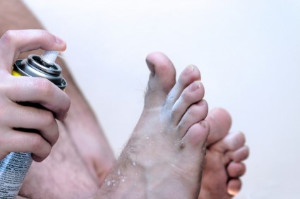
(616) 846-3400
Fax: (616) 846-3406

(616) 846-3400
Fax: (616) 846-3406
 Athlete’s foot is a fungal infection that causes the feet to become dry and flaky. It is very contagious and can be spread from towels, floors, and even clothing. Combined with the fact that athlete's foot thrives in warm and moist environments, these infections are usually spread in showers, gym locker rooms, and swimming pools. Once the fungal spores have made it to the feet, they can enter any fissure or sore to begin spreading, unless the feet have been thoroughly washed and dried. If the patient touches or scratches the infection, they can spread it to other parts of their body as well. While foot hygiene is key to preventing an infection, patients who have already gotten athlete’s foot should consult with a podiatrist, since prescription medications may be necessary for treatment.
Athlete’s foot is a fungal infection that causes the feet to become dry and flaky. It is very contagious and can be spread from towels, floors, and even clothing. Combined with the fact that athlete's foot thrives in warm and moist environments, these infections are usually spread in showers, gym locker rooms, and swimming pools. Once the fungal spores have made it to the feet, they can enter any fissure or sore to begin spreading, unless the feet have been thoroughly washed and dried. If the patient touches or scratches the infection, they can spread it to other parts of their body as well. While foot hygiene is key to preventing an infection, patients who have already gotten athlete’s foot should consult with a podiatrist, since prescription medications may be necessary for treatment.
Athlete’s Foot
Athlete’s foot is often an uncomfortable condition to experience. Thankfully, podiatrists specialize in treating athlete’s foot and offer the best treatment options. If you have any questions about athlete’s foot, consult with Dr. Robbi Young from Grand Haven Foot & Ankle. Our doctor will assess your condition and provide you with quality treatment.
What Is Athlete’s Foot?
Tinea pedis, more commonly known as athlete’s foot, is a non-serious and common fungal infection of the foot. Athlete’s foot is contagious and can be contracted by touching someone who has it or infected surfaces. The most common places contaminated by it are public showers, locker rooms, and swimming pools. Once contracted, it grows on feet that are left inside moist, dark, and warm shoes and socks.
Prevention
The most effective ways to prevent athlete’s foot include:
Symptoms
Athlete’s foot initially occurs as a rash between the toes. However, if left undiagnosed, it can spread to the sides and bottom of the feet, toenails, and if touched by hand, the hands themselves. Symptoms include:
Diagnosis and Treatment
Diagnosis is quick and easy. Skin samples will be taken and either viewed under a microscope or sent to a lab for testing. Sometimes, a podiatrist can diagnose it based on simply looking at it. Once confirmed, treatment options include oral and topical antifungal medications.
If you have any questions, please feel free to contact our office located in Grand Haven, MI . We offer the newest diagnostic and treatment technologies for all your foot care needs.